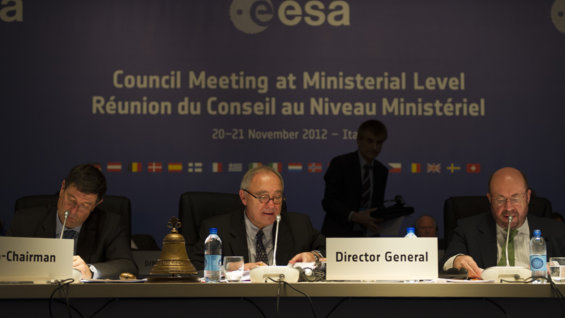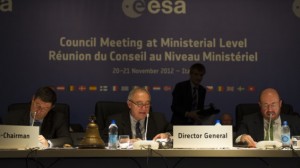

ESA’s Director Generale Jean-Jaques Dordain at the ministerial held in Naples, on November 2012 (Credits: ESA).
The European Space Sciences Committee (ESSC) has released a statement containing recommendations on the outcomes of the ESA council meeting at ministerial level held in Naples on 26-27 November 2012.
The European Space Sciences Committee is an independent committee comprising 24 members from 13 European countries. Committee members are drawn from experts active in all fields of space research. The mission of the ESSC is to provide an independent voice on European space research and policy.
The ESSC statement is particularly critical of the perceived lack of decisions that resulted from the ministerial meeting, particularly with regards to space data management.
No specific decision was taken at Naples concerning the management of space data, although ESSC believes that the approved Political Declaration towards the European Space Agency that best serves Europe plan could provide means to support the analysis, interpretation, archiving, and distribution of space data in the future.
ESSC also expressed concern for the future of science programs, since their budget has been partially eroded, recommending actions to prioritize the scientific return of ESA programs. Specifically, the committee had expected a stronger statement regarding the importance of ExoMars with a clear strategy to bring the mission to final scientific fulfilment. The abandoning of the Lunar Lander program has been also criticized, stating that lunar exploration should be an integral part of ESA’s Exploration Program. The Earth Observation and GMES programs also came under scrutiny for the amount of resources used and the lack of clarity surrounding the situation of the programs.
ESSC stressed the fact that Europe is not in a position to achieve its scientific objectives in life and physical sciences in space by itself, and that the ministerial meeting should have addressed the post-ISS scenario.
Considering the last statement, the committee regretted that no agreement had been reached on collaboration with other agencies. According to ESSC collaboration with China would have been a highly beneficial strategy for the near future.
On a less critical note, the ESSC viewed the decision to proceed with the development of Ariane 5 ME and Ariane 6 as positive.
The video below shows a press conference, concluding the proceedings of the ESA Ministerial Council conference in Naples:

















































































































![A trajectory analysis that used a computational fluid dynamics approach to determine the likely position and velocity histories of the foam (Credits: NASA Ref [1] p61).](https://www.spacesafetymagazine.com/wp-content/uploads/2014/05/fluid-dynamics-trajectory-analysis-50x50.jpg)



Leave a Reply